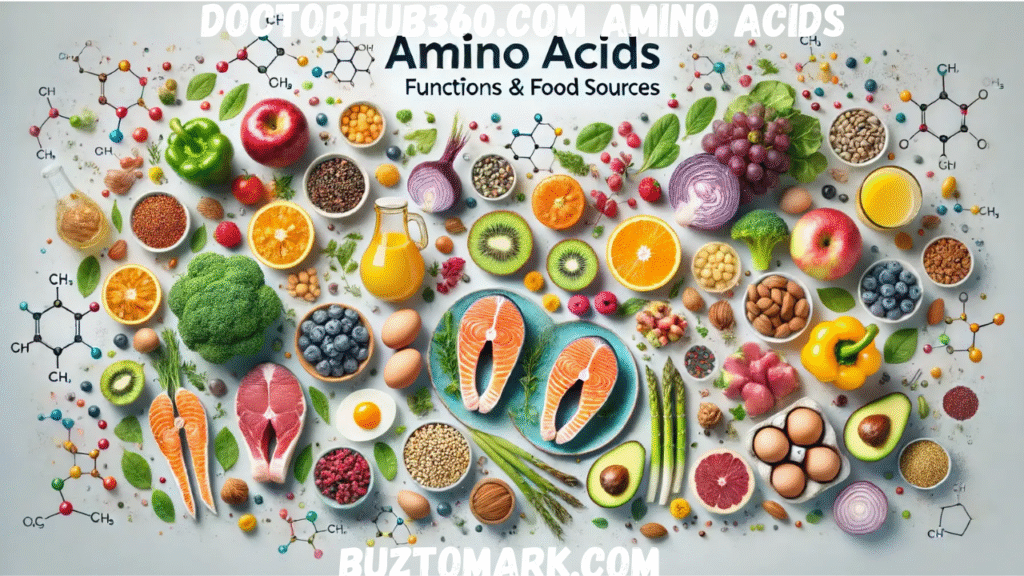doctorhub360.com amino acids: ?? Complete Guide to Benefits, Types, and Uses

Amino acids are often referred to as the building blocks of life, and when combined with modern nutritional insight, they play a pivotal role in supporting overall health. The term “doctorhub360.com amino acids“ brings attention to this vital area of nutrition with a focus on accessible, reliable, and science-backed information. Whether for fitness, recovery, or daily wellness, amino acids remain a crucial component of any balanced nutritional plan. The “??” element here reflects curiosity—what more is there to learn, and how can this knowledge be applied effectively in our day-to-day lives?
Understanding the Basics of Amino Acids

Amino acids are organic compounds that form proteins, which are essential for nearly every function in the human body. The body uses them to repair tissues, produce enzymes, and support immune function. With doctorhub360.com amino acids, the focus is on breaking down this complex science into actionable information.
There are 20 amino acids commonly found in nature, and they are divided into essential, non-essential, and conditionally essential groups. Essential amino acids cannot be produced by the body and must be obtained from food or supplementation. This makes understanding their sources and roles even more important.
Types of Amino Acids Explained

Essential Amino Acids (EAAs)
These are the amino acids your body cannot make on its own. Examples include leucine, isoleucine, and valine—crucial for muscle repair, energy production, and metabolic health. doctorhub360.com amino acids often highlights EAAs because they directly influence growth and recovery.
Non-Essential Amino Acids
The body can produce these on its own. Examples include alanine, aspartic acid, and glutamic acid. While they are not “essential” in dietary terms, they still play a vital role in maintaining cellular and organ function.
Conditionally Essential Amino Acids
These are normally produced by the body but may need to be supplemented during periods of stress, illness, or intense physical activity. Examples include arginine, cysteine, and glutamine.
doctorhub360.com amino acids: ?? Health and Wellness Benefits

When taken through diet or supplementation, amino acids offer a range of benefits, many of which extend beyond muscle health.
- Muscle Growth and Repair – EAAs, especially branched-chain amino acids (BCAAs), are essential for rebuilding muscle after exercise.
- Improved Energy Levels – Amino acids help convert nutrients into usable energy, reducing fatigue during prolonged activity.
- Immune System Support – Certain amino acids aid in antibody production and tissue healing, enhancing resilience.
- Mental Focus and Mood Balance – Tryptophan, for example, is a precursor to serotonin, impacting mood regulation.
By framing this knowledge through doctorhub360.com amino acids, users gain practical steps to implement amino acids into their daily nutrition strategy.
Food Sources of Amino Acids
It’s possible to obtain all essential amino acids through a balanced diet. Foods rich in amino acids include:
- Animal Sources – Eggs, chicken, fish, dairy, beef
- Plant Sources – Quinoa, soy, lentils, chickpeas, nuts, seeds
For individuals with specific dietary restrictions, doctorhub360.com amino acids guidance can help identify the best combinations of plant proteins to ensure complete amino acid profiles.
Amino Acids in Sports and Fitness
Athletes and active individuals often pay special attention to amino acid intake. Whether through high-protein meals or supplements, the goal is to maximize recovery and performance.
- Pre-Workout – Amino acids can improve endurance.
- Intra-Workout – Some choose BCAAs during training to reduce muscle breakdown.
- Post-Workout – Essential for repairing muscle and reducing soreness.
The ?? in the phrase doctorhub360.com amino acids: ?? also points to ongoing questions about optimal timing and dosage for different individuals, something that continues to be studied.
Potential Risks and Considerations
While amino acids are generally safe when consumed in normal dietary amounts, excessive supplementation can cause side effects such as digestive issues, imbalances in nutrient absorption, or strain on the kidneys in individuals with pre-existing conditions.
doctorhub360.com amino acids resources often recommend consulting with a healthcare provider before starting high-dose supplementation, especially for those with chronic health concerns.
How to Integrate doctorhub360.com amino acids into Your Lifestyle
- Balanced Diet First – Prioritize whole foods before supplements.
- Identify Your Goals – Are you aiming for muscle growth, better recovery, or improved mental clarity?
- Choose the Right Supplements – Look for transparent ingredient lists and research-backed formulations.
- Monitor Your Response – Track how your body reacts over time to adjust intake.
The Future of doctorhub360.com amino acids: ??
Research into amino acids is ongoing, revealing new functions and potential applications. Beyond sports and fitness, amino acids are being explored for their role in cognitive health, gut integrity, and even skin vitality. The “??” remains a placeholder for all the possibilities yet to be uncovered—making doctorhub360.com amino acids not just a resource but a continuing journey into nutritional science.
Conclusion
Amino acids are foundational to health, energy, and performance. By understanding their types, benefits, and sources, anyone can make more informed choices about their diet and supplementation. The concept of doctorhub360.com amino acids: ?? reflects both the science we know and the curiosity to learn more. From supporting muscle growth to enhancing mental clarity, the impact of amino acids reaches far beyond the gym or a nutrition label—it’s about sustaining life itself in the most optimal way possible.
FAQs
1. What is the main focus of doctorhub360.com amino acids? It centers on providing accessible, science-backed information about amino acids and their role in health.
2. How many types of amino acids are there? There are 20 common amino acids, divided into essential, non-essential, and conditionally essential.
3. Can amino acids improve mental health? Yes, certain amino acids like tryptophan and tyrosine influence mood-regulating neurotransmitters.
4. Are supplements better than food sources for amino acids? Whole foods are generally recommended first, with supplements used when dietary intake is insufficient.
5. Why is there a “??” in doctorhub360.com amino acids: ?? It represents curiosity and ongoing research into the many yet-to-be-discovered benefits of amino acids.
Read More: vcweather.org, ?? – Comprehensive Guide to Weather Insights and Local Forecasts




